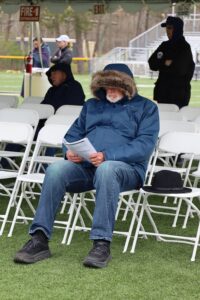EASTHAM — Town meeting voters overwhelmingly approved a $44.2-million fiscal 2025 operating budget with a $1-million Proposition 2½ override on Saturday, May 4. By an even larger margin, they endorsed a second override for $300,000 to hire two additional police officers. The budget was adopted on a 235 to 56 vote; the added police positions passed by a vote of 277 to 25.

The two overrides will also have to be approved in ballot questions at the annual town election on Tuesday, May 21.
All the articles on the warrant won approval with no particularly close votes. The longest discussions were about adopting a specialized energy code for new construction, which was approved with 68 percent in favor; imposing limits on short-term rentals, which won approval by 85 percent of those voting; and allocating $447,200 in community preservation funds for reconstruction of the Old Schoolhouse Museum, on which 75 percent voted yes.
All 27 warrant articles were dispensed with in about three and a half hours. At 1:25 p.m., as voters were punching their clickers in the final vote of the day, Town Moderator Scott Kerry quipped, “In Truro right now they’re serving lunch.” (Eastham is the only Outer Cape town that uses an electronic voting system at town meeting.)
Budget Questions
Not everyone was happy with the operating budget, which is up 14 percent over last year. “We have a lot of elderly living in this town,” said Brian Voke. “This budget does not work for people on fixed incomes. It’s going to drive them to leave town.”
Ian Drake took exception to a statement in the report of the finance committee, which wrote, “Although the overall tax burden for the median valued home is estimated to increase by $701 to $5,642, this still maintains Eastham taxpayers’ position among the lowest on Cape Cod and well within the bottom half in Massachusetts.”

“Saying we’re in the bottom half in Massachusetts is like saying we’re the skinniest pig in the butcher’s pen,” said Drake. “We’re all getting slaughtered.”
Gayle Ashton questioned the finance committee’s attribution of some of the budget increase to rising interest rates on long-term debt. “I thought big debts have fixed rates,” she said.
“Will we see the same kind of increase next year?” asked Mike Smith. “It seems like bait and switch.”
Finance Director Rich Bienvenue said that long-term bonds are not issued at the beginning of a project but only as the expense is incurred. “These aren’t new projects,” he said of the newly incurred debt, “but previously approved ones that we’re seeing the effect of now. We weren’t going to ask for the money before it was needed. Our debt is fixed and scheduled out over the next 30 years. This year and next are the peak. We do expect it to drop off after that.”
Nancy Benben noted that a breakdown in communication with Nauset Regional School District officials had been cited as a reason for a budget gap that wasn’t discovered until late in the process. “How is lack of communication with the school administration being addressed?” she asked.

Bienvenue acknowledged that there had been a problem, as reported in the Independent, and said, “We have spoken with the superintendent and feel we will have good communication going forward.” Members of the town’s finance committee have started attending school budget hearings, he added.
Ellen Sicinski asked how much of the cost of the schools was related to educating children from outside the four Nauset district towns. “Why are we not pushing for Truro and Provincetown to be forced into the Nauset regional system?” she asked.
“There’s no way to force other towns to participate,” Bienvenue replied. “We negotiate tuition agreements with Provincetown and Truro that pay substantial amounts for each student.” As for students who come from other towns outside the district under the school choice program, he said that factor does not have an effect on the town’s operating budget.
Police Staffing
Select board member Jamie Demetri said that adding two positions would enable the police dept. to add an officer to each shift and be able to respond to two emergencies simultaneously. “There has been no increase in staffing for 30 years,” she said. “You know how much our little town has changed.”

Brian Voke again objected. “In another year, it probably would be entirely appropriate,” he said. “This should be postponed.”
“Part of the reason it’s on this year is my fault,” said Town Manager Jacqui Beebe. “The chief has been asking for this for five years. Every year I have said, ‘Not this year.’ This is not an extra. If we continue to put this off, it will put our officers and residents at risk.”
Several residents came to the microphones to support the article.
“We have one of the most respectful, hard-working police departments I’ve seen,” said Jennifer Cusack. “We’ve all seen the increase in traffic coming through our town and the number of accidents the officers have had to respond to.”
“Eastham is a remarkably civil community,” said David Sutherland. “But in general, society is getting more divisive and polarized. We are hearing more public figures advocating violence. We can’t count on Eastham staying as a bubble. And we have increasing threats from climate change. The police would play a critical role in responding to them.”
Moderator Kerry’s announcement of the lopsided vote on the police article was greeted with applause.
Short-Term Rental Rules
Voters adopted a bylaw limiting short-term rental certificates to two per property owner, modeled on similar bylaws voted in by Provincetown and Tisbury and approved by the state attorney general. Current holders of more than two certificates would not be affected until their properties are transferred or the certificates are not renewed. Cottage colonies would not be affected, said the select board’s Demetri.
“This will reduce the conversion of year-round housing to short-term rentals,” she said. “We need residents who live here, work here, and have families here.”

Karl Hartmann asked, “What is the experience of other towns that have enacted this type of law?” He also questioned why partnerships were not listed among the types of entities covered by the bylaw. “Post-registration distribution can change. If I have an LLC, I can bring in more people later. I’m a law professor,” he added.
“I’m sure attorneys can find ways to work around any regulation we adopt,” said Beebe. “What we’re trying to do is reduce the proliferation of residential units for business use. We don’t know the effect. It’s too early.” She added that there was no particular reason why partnerships were left out of the wording.
Carol St. Aubin said that she owns cottage colonies that were built by her parents. “I have told my children, ‘Someday this will all be yours.’ You’re telling me that I can’t do that.”

“We’re not trying to hurt anyone who is currently renting,” Beebe responded. “We’re just trying to prevent the purchase of property in the future for rental purposes. Cottage colonies are exempt. There’s nothing to prohibit anyone from inheriting property. I’m sure the law professor can help you out.”
“Is this really going to make a difference?” asked Ellen Sicinski. “Do you have statistics on corporate ownership?”
“We have a handful now,” said Beebe. “If we don’t pass this, we will become like Nantucket. This is one arrow in our quiver. We are desperate, trying to use every tool we have to fight the crisis. If you go on Airbnb, you will see this happening. Year-round rental units in Eastham went from 400 to less than 100. That’s the problem.”
“If I owned five houses, I would be very upset by this,” Sicinski said. “This is Big Brother overreach.”
Mary Nee, chair of the Eastham Zoning Task Force, came to the microphone. “The task force recognizes the long tradition of ownership of seasonal properties to generate income,” she said. “Over the past decade we have experienced a dramatic rise in part-time residences, now approaching 60 percent of the total. Of even greater concern is the emergence of investment firms targeting tourist-area real estate and bundling these properties into financial instruments.
“Great Barrington has had this almost identical bylaw for several years,” Nee added, “and they believe it has been effective.”
“In the 63 years I’ve lived in Eastham, I’ve watched entire neighborhoods be gutted,” said Sarah Burrill. “This isn’t perfect, but it’s a step in the right direction. Otherwise, we’ll end up with a ghetto for workers and the rest for the very rich people they serve.”
Specialized Energy Code
The adoption of the specialized energy code as part of the town’s building code was supported by the town’s climate action committee, whose members argued that the best way to reduce greenhouse gases was to manage emissions from buildings. Roberta Longley said that 32 towns have done so, including Truro and Wellfleet. It would not apply to existing homes and businesses, she said, only to new buildings.

Select board member Demetri said she opposed the article, arguing that it would increase the cost of construction and “work against Eastham’s attainable housing efforts.”
“This is one of the few things Jamie and I disagree on,” said select board member Aimee Eckman. “I do not think it will increase building costs either upfront or long-term.” The code would not require solar panels, she said, but would encourage their use in new construction.
“This is a choice, not a requirement,” said Olav Hegland of the climate action committee. “All we’re asking is that you offset fossil fuels with solar or other renewables.”
Laurence Perry was not convinced. “I’m fully in support of energy savings and helping the planet,” he said, “but this smacks of Big Brother. I don’t need anyone telling me what to put on my roof. I’m opposed to government keeping an eye on what we do.”
“There’s no mandate here,” said Roberta Longley. “Nobody is stopping you from using fossil fuels.”
The vote on the energy code was 187 in favor and 89 opposed.
Community Preservation Funds
All of the recommendations of the community preservation committee for allocation of funds were adopted, but not without a kerfuffle over a request for $447,200 for reconstruction of the north wing of the Old Schoolhouse Museum.

“The museum is open one day a week, with very limited hours,” said Jonathan Howard. “I don’t understand allocating this amount of money. It’s a great museum, but it’s not open.”
Joanna Buffington of the preservation committee said that the museum has “a lot of stuff stored that they can’t show. There’s hope that it will be open more often. They had a $100,000 anonymous donor. They’re doing more fundraising for this, and this amount is likely to go down.”
“As far as our being open, that’s entirely dependent on volunteers,” said Eileen Seaboldt. “We are open two days in the summer. Please feel free to volunteer.”
An amendment seeking to reduce the amount of the allocation by $246,753 was defeated.
“When we get a good project, we should support it,” said Mike Hager. And the voters ultimately did, on a vote of 137 to 45.
Voters also approved a home-rule petition in Article 6, submitted by Laura Kelley, asking the state legislature to allow Eastham to establish its own rules for regulating pesticides. The vote was 167 to 57.



